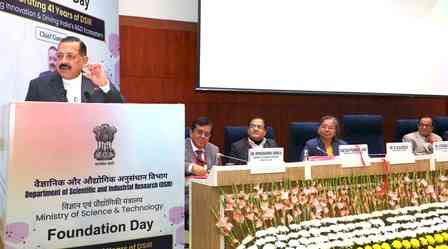Industry reactions on Union Budget (Part-19)

Girish Kousgi, MD & CEO, PNB Housing Finance
“As our nation marches towards Amrit Kaal, the intended infusion of Rs.79,000 crores towards affordable housing is a positive move. Its’s a win-win situation fortifying our nations rural infrastructure and adding power to lower and middle income groups. The wheels are set in motion towards an inclusive and sustainable economic growth and this 66% increased commitment will bolster higher rural participation”.
Prakash Chhabria, Executive Chairman – Finolex Industries Ltd.
“We appreciate the budget's emphasis on promoting consumption and reviving the economy. The augmented focus on the agriculture sector will facilitate the farmers in smoothening of their operations , get more funds for inclusive rural development. The creation of agriculture infrastructure funds along with separate allocation for high-value horticulture will give the industry a much-needed boost. The industry would also gain from the 11% increase in the agriculture credit objective from Rs 18 lakh Cr to Rs 20 lakh Cr. We eagerly await the implementation of these measures and their impact on agriculture and farmer profitability. This budget also highlights separate focus on providing water connections & toilet facility to households. This will spur demand in the plumbing and sanitation segment. Additionally, a hike in capital expenditure by 33 per cent to Rs 10 lakh crore for infrastructure development and the allocation of Rs. 79000 Cr to affordable housing will act as a catalyst for building, construction materials and allied sectors.”
Ankur Maheshwari, Chief Financial Officer, Freo
"The Union Budget of 2023-24 has demonstrated a clear commitment towards financial inclusion, support for the startup ecosystem and personal tax reform. It is a highly inclusive budget which has addressed many key growth pillars of the economy. A huge relief has come in the form of personal taxes, the New Tax regime which is now also the default tax regime has been incentivised significantly to improve adoption. The Budget has provided a playing field for taxpayers by increasing rebates and ensuring that there is no income tax levied up to 7 lakh rupees in income. Additionally, the revised tax slabs under the new tax regime and the extension of the standard deduction will ensure that the salaries class will have more liquid cash which will directly impact the consumption and investment. We are also very appreciative of the Govt’s focus on the startup ecosystem and reducing compliance related burden which will inevitably ensure ease of business for startups. Focus has also been provided on fiscal support for Digital Payments Infrastructure which has already proven to be greatly impactful for Indian fintech. We are positive that this budget will set the stage for India’s growth to the next level."
Dinesh Pratap Singh, Co-Founder, WoodenStreet
“With easing capital gain taxation and carry forward of losses on change of shareholding of start-ups from seven years of incorporation to ten years, the country could become home to many more startups in the coming year.
Another important announcement about setting up the Agriculture Accelerator Fund will encourage agri-startups by young entrepreneurs in rural areas. Moreover, bringing out the National Data Governance Policy will unleash innovation and research by start-ups and academia. The several supportive policies for startups in Budget 2023 by the Finance Minister will help to scale up the operations to a greater extent and create a boom for the startup ecosystem across the country.”
Ridhima Kansal, Director, Rosemoore
“The Union Budget this year has a slew of incentives towards the start-up ecosystem, which highlights GOI’s unwavering commitment towards building a powerful & prolific start-up ecosystem in the country. The total fund allocated for start-ups has been close to 1000 Crores. Out of this, 283 Crores have been allocated to the seed fund. This is a marked increase from the past budget, when INR 100 Crores were allocated. GOI has also embarked on an agritech fund to further support, agritech start-ups in India. A new Data governance policy will also be unveiled which will give an institutional framework to use anonymous data. These are all laudable steps.”
Delphin Varghese, Co-Founder & Chief Business Officer, Adcounty Media
“In the Union Budget 2023-24, Finance Minister Nirmala Sitharaman Entrepreneurship acknowledged the importance of startups for the country’s economic development. In her Budget speech, she mentioned that India is now the third largest startup ecosystem globally, and our startups rank second in innovation quality among middle-income countries worldwide. In this budget, she proposed to extend the date of incorporation for income tax benefits to startups from 31.03.23 to 31.3.24. If all of the company's owners continue to own the shares, the requirement of continuity of at least 51% shareholding is waived for qualifying start-ups for setting off carried forward losses. Mrs Sitharaman extended the time frame of this relaxation from the current seven years to losses sustained within ten years if the startup’s incorporation. She also announced an Agriculture accelerator fund that will be set up to encourage agri-startups by young entrepreneurs in the country.”
Nidhi Aggarwal, Founder, Spacemantra
“Until now, the tax break was only available to startups founded in March 2023. FM has extended the date of incorporation for new businesses to take advantage of income tax benefits until March 31, 2024. The finance minister also proposed extending the benefit of carry forward of startup losses on change of share holding to 10 years of incorporation from the current 7 years. This will boost the country's emergency startup and help it achieve its five trillion dollar vision.”
Dr. Deepak Jain, Founder, The Fragrance People
“The government has taken a number of steps to encourage the growth of startups in the country. The Startup India initiative implements the Fund of Funds for Startups (FFS) scheme, the Startup India Seed Fund Scheme (SISFS), and the Credit Guarantee Scheme for Startups (CGSS) to provide capital at various stages of a startup's business cycle. The FM also proposed extending the benefit of carrying forward losses to startups for a period of ten years. The budget measure comes at a time when the startup sector is experiencing a funding winter, with investors only investing about $25 billion in Indian startups in 2022, a 40% decrease from the $42 billion raised across 1,500+ deals in 2021. FM's move is notable for the growing entrepreneurial spirit in the country.”
Sahil Arya, Co-Founder & Director, Fat Tiger
“The government will release a National Data Governance Policy to encourage startup performance and to unleash startup innovation and research in their respective fields. This allows access to anonymized data. This action is intended to promote the Startup India initiative, which was launched in 2016 with the goal of creating a strong ecosystem for nurturing innovation and encouraging private investment in the startup ecosystem.”
Dilip Modi, Founder, Spice Money
“We are delighted to see the government’s continued focus on the rural sector in this year’s Budget as well. MSME’s are the backbone for the growth of India’s economy. Initiatives such as offering relief to MSMEs by returning 95 percent of the forfeited amount, revamping of the credit guarantee scheme, reducing the cost of credit by 1 percent and enabling MSMEs to avail the benefit of presumptive taxation as well as allowing expenditure deduction on payments made undoubtedly showcase the government’s vision for the growth and development of the sector. Furthermore, setting up DigiLocker will ensure a faster and secure way of storing and sharing documents thereby enabling quick turnaround and cost reduction for the sector.
Initiatives such as setting up the Agriculture Accelerator Fund and building an open source, open standard and interoperable digital public infrastructure will create a platform for existing agri-startups as well as upcoming ventures to provide innovative and tech-led facilities to farmers that will help in revamping the sector and encouraging aspiring entrepreneurs thereby driving next level growth for the sector.
The government’s vision of a technology-driven and knowledge-based economy will play an instrumental role in creating a conducive environment for startups across the spectrum, especially those with a rural focus. The proposal of providing income tax benefits as well as providing the benefit of carry forward of losses will support the startup ecosystem to flourish further and create numerous opportunities in the coming future.
The government’s focus on further enhancing domestic tourism under the Vibrant Villages Programme, creation of jobs and entrepreneurship opportunities under ‘Dekho Apna Desh’ initiative and proposal of public-private partnerships will help in the economic development of underserved citizens and identifying and utilising the untapped potential existing across the length and breadth of the country.
The unprecedented growth of India's economy fuelled by digital payment initiatives like UPI is a testimony that we are on the right track to become a 5 trillion economy. We look forward to seeing India’s next phase reaping the benefits of the initiatives announced during the Budget session and partnering with the government to drive financial inclusion for the last mile.”
Hitesh Sharma, Tax Partner and National Leader – Lifesciences, EY India
“There were some key highlights in this year’s Budget for the Pharma and Healthcare Industry.
On the positive front, the government health expenditure has shown an increase from 1.40% of GDP in FY 19 to 2.1% of GDP in FY 23 viz a budget plan of Rs 88,956 crore for FY 23-24. To boost R&D and innovation the Government announced a new pharma program to be undertaken through centres of excellence. Further facilities in select ICMR labs will be made available for research by public and private medical faculties and private R&D teams for collaborative research. These are steps in the right direction.
Other initiatives announced in the budget which could help the Healthcare industry include a plan to have three Centres for excellence of Artificial Intelligence for health, agriculture, and sustainable system to foster partnership of industry players in conducting research and develop cutting edge applications. Also 157 nursing colleges are to be set up in the existing medical colleges to boost the much-needed manpower for the healthcare sector.
Further, current customs exemption for specified products are extended for lifesaving drugs and specified drugs, medicines, diagnostic kits by two years up to 31 March 2025 and for Specified drugs and medicines supplied free of cost to patients under Patient Assistance Program, specified medical and surgical instruments, hospital equipments up to 31 March 2024.
Having said that, the much-hoped income tax benefit in the form of higher R&D linked weighted deductions or simplification of the patent box regime were not considered. Also missed was extending customs exemption for goods used in pharma sector for R&D beyond 31 March 2023.”
Tanu Jain, Co-founder and CEO, Reboot Game Studios Pvt. Ltd.
“We appreciate the government's decision to keep the GST rate unchanged in the AVGC sector. This industry has immense potential for growth and job creation in India. This will encourage more investment in the industry, which will lead to more job opportunities and a thriving AVGC ecosystem in India.
It is also great to see the government focusing on youth and skill-based development through the fourth phase of Pradhan Mantri Kaushal Vikas Yojana (PMKVY). By focusing on market-driven skills such as coding, AI, Robotics, IoT etc, the scheme will equip young individuals with in-demand skills that will further increase their employability and is the need of the hour.”
Ramanujam Komanduri, Country Manager, Pure Storage India
“The Union Budget presented by the Hon’ble Finance Minister is growth-oriented and inclusive. The impetus for the 'Digital India' vision is clear from budgetary allocations across sectors like infrastructure, skill development, sustainability, MSME, and entrepreneurship.
This budget provides numerous growth opportunities for the technology industry by bringing digital solutions and innovation in legacy sectors like infrastructure, manufacturing, education, railways, healthcare, financial services, and regulatory bodies to turn India into a technology-driven, knowledge-based economy. Also commendable is a clear intent and investment in making India a net zero carbon emission country by 2070 through National Green Hydrogen Mission.
Overall, the budget 2023 promises to sustain and catalyze India’s economic and digital growth with a strong role played by technology."
Raghunandan Saraf, Founder & CEO, Saraf Furniture
“The Union Budget 2023 is out, with a few hits and misses in the retail sector. The industry was expecting a few direct SOPs, which were completely absent from the budget, particularly regarding the Input Tax Credit. However, looking at the positive aspect of it, the budget has increased cash flows in the hands of individuals through relaxed tax provisions; this will undoubtedly have a direct impact on their spending, and we see this as a window of opportunity that can benefit the retail sector through increased spending. Further reductions in personal tax slabs, rates, and other measures should help increase disposable income for the middle class, with a multiplier effect on the economy and retail and consumer sectors.”
Susheel Tejuja, Founder & MD, PolicyBoss.com
“The budget is indicative of the continued economic growth resolve that the government has underlined via a slew of reforms, rebates and announcements all aimed at turning India into a consumption economy. Increased infra push of 10 lac Cr will boost trade and transit economy alike, resulting in rapid growth corridors fueled by public infrastructure spending. Announcements regarding Tax Reforms and rebates for companies incl. tax implications, unified filing, ease and transparency in data access and governance, with focus on MSMEs underlines continued government efforts in ensuring ease of doing business and boosting entrepreneurship across industries. Direct Tax reforms with revised tax slabs under new Tax Regime will benefit masses, yielding higher take-home salaries. Simplified tax filing will further boost individual tax payer confidence. From insurance perspective, announcement revision of tax exemption limit from proceeds of high value insurance policies is noteworthy as insurance companies typically receive 12-15% of their overall premiums with individual premiums of ₹ 1 Cr and above. As further details emerge, one will get more clarity on exact specifics. Increased infra push augurs well for general insurance companies as new project insurance related opportunities will get created. For senior citizens, revision of limit to 30 lac will help get better reruns on higher saving amount. This is a positive development for LIC and Post Office. To sum up, this budget is forward looking and progressive, with the common man benefiting from Ease in Access to Quality Education, Housing and Skill Development & Enhancement while boosting economic growth and spurring entrepreneurship.”
Akash Sinha, Co-founder & CEO, Cashfree Payments
“The Finance Minister has presented a distinctive set of measures in the Union Budget 2023-24 with a streamlined focus on rapid, holistic and inclusive economic growth. It is a well-crafted statement of intent, drawn from the success and learnings from the past with the potential to further enhance India’s growth prospects.
Realising the crucial potential of digital infrastructure in the financial sector, the hon’ble FM has announced measures to increase the scope of DigiLocker services for individuals and MSMEs. This will certainly aid in enhancing the accessibility of financial services with higher convenience and simplified processes with robust security.
It is also encouraging to see that the hon’ble FM has given due attention to compliance in the financial sector. A simplified KYC process, adopting a ‘risk-based’ approach as opposed to a ‘one size fits all’ outlook will ensure accurate and sophisticated verification as well as in-turn regulated operations in the financial services space. Highlighting the growth of digital payments and fiscal support for digital public infrastructure is also appreciable” as this further contributes to India’s digitisation efforts.”
Nageen Kommu, CEO, Digitap
“The Union budget announced by FM holds great significance for the Fintech sector, as it lays down the roadmap for further growth and development in the industry. Recommendations on adopting a risk based approach for KYC and a system that is amenable to meet the needs of Digital India will ensure measures taken to control potential financial crimes are in line with the risks identified.
Additionally, extending incorporation benefits for startups to 10 years will further boost sentiment and encourage entrepreneurship in the country. This will also make startups more attractive to investors since a lower tax burden means better income and returns on investment.
Lastly, provisions to boost R&D and innovation for financial inclusion, and create innovative financial products by expanding the ambit of the Digilocker facility and using 5G, AI and other technologies will help bridge existing gaps in the system and auger a positive impact to the country as a whole in the long run.”
Jaya Vaidhyanathan, CEO, BCT Digital
“The budget was an excellent opportunity for the Finance Minister to take advantage of India’s pole position globally, and she has done justice to it.
With finances bolstered by recent oil gains related to events across Europe and clean PSB balance sheets, the government had decided to spend on infrastructure in a big way, while still maintaining the controlled fiscal deficit path. The focus on refining the banking and financial markets through technology-led initiatives, such as the National Financial Information Registry and unified KYC; replacing the tedious process of document submission with DigiLocker storage; result-based financing, and reforms to develop the municipal bond market will pave way for the maturity of our markets to global benchmarks.
By recognizing Green growth as an important pillar in the budget, the FM has laid the path towards economic development that is sustainable and in line with global efforts to tackle climate change. Green growth includes initiatives such as the promotion of renewable energy sources and the adoption of more sustainable practices which in turn, will promote broader Environmental, Social and Governance (ESG) initiatives by companies.
On the other hand, the rationalization of tax slabs, simplification of compliances for small businesses, and most importantly, the reduction in personal income taxes would put more money in the hands of the public, thereby boosting the economy after the pandemic-induced slowdown over the last couple of years.”
Sujata Pawar, Co-Founder & CEO at Avni- A Feminine Hygiene and Menstrual Healthcare Startup
"We applaud the initiatives declared in the Union Budget 2023-24 by Honorable Finance Minister Nirmala Sitharaman. The budget strikes an appropriate balance between confronting the key foundations of Health & Well-being, Inclusive Development, Human Capital, Innovation, and R&D, as well as laying the groundwork for a prosperous economy by investing heavily in infrastructure. The government’s intention to empower women entrepreneurs through self-help clusters focused on raw material supply, product branding, and marketing is also a very unique and sensible step given that community impact plays a major role with women in India. Furthermore, the announcement of 157 new nursing colleges will further aid strengthen India’s primary healthcare system."
Dr. Payal Kanodia, Trustee, M3M Foundation said:
“The budget for this year is very encouraging, with a focus on inclusive development, green growth, and youth power. The announcements in various fields, such as tax relief, education improvements, and focus research and development, are encouraging. The increase in allocation for school education from Rs 63,449 crore (Budget Estimate) in 2022-23 to Rs 68,804 crore in 2023-24 is a welcome step for the education sector. The availability of the National Digital Library to children will greatly benefit the children. A strong focus on youth skill development will assist industries to attract young talent. Another significant development is the establishment of 30 Skill India International Centres across various states to prepare youth for international opportunities. We heartily welcome the 'Mahila Samman Saving Certificate' for women with a fixed interest rate of 7.5 per cent, for over a period of two years. This will definitely lead to shaping India into a stronger and growing economy in the future.”
Nikhil Mathur, Managing Director India & Head of Data Partnership & Innovation-APAC at GfK:
“The budget for 2023-24 has struck the right chords and is balanced. The massive push for capital investment and spending augurs well across industries as it shall lead to increased job creation. With the new tax slabs, there is an expectation of increased disposable income and consumer purchasing power which will have a positive impact on the retail sector. The reduction in customs duties for mobile phone manufacturing inputs and television along with the continuation of existing import sops will build more momentum in domestic manufacturing capacity. Going forward, we expect companies in the consumer tech sector to benefit from the progressive measures announced today. Overall, a budget focused on delivery.”


 City Air News
City Air News 










